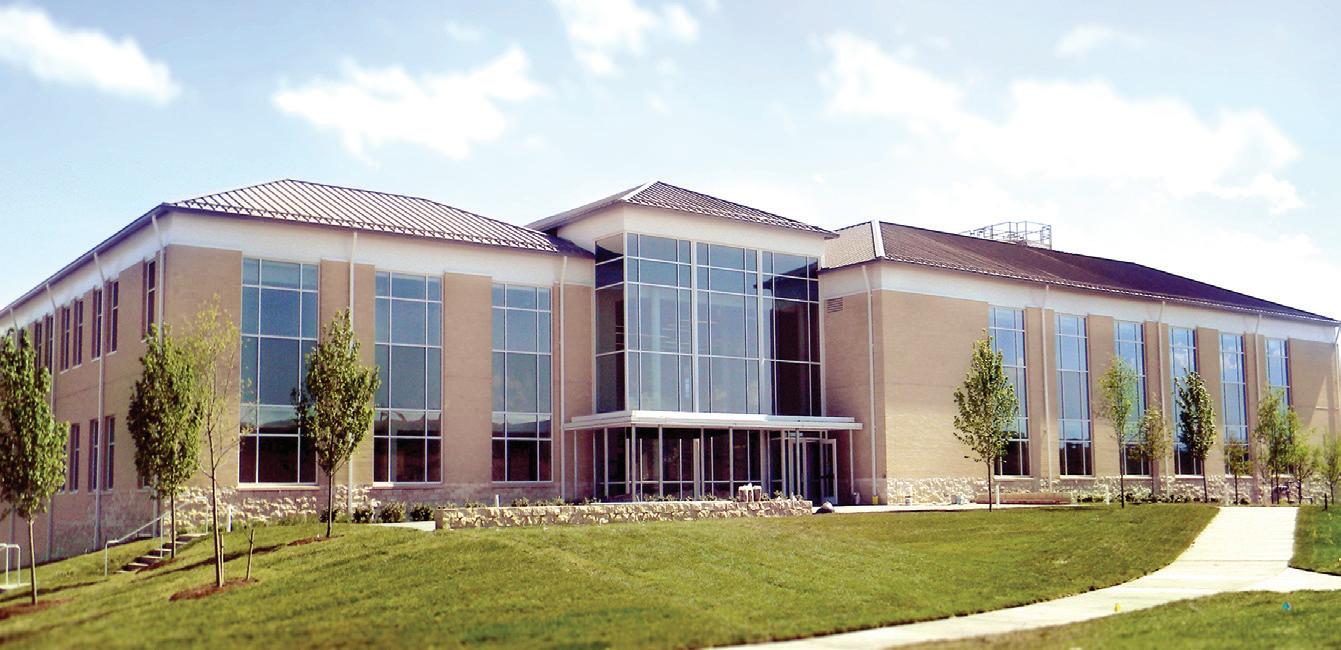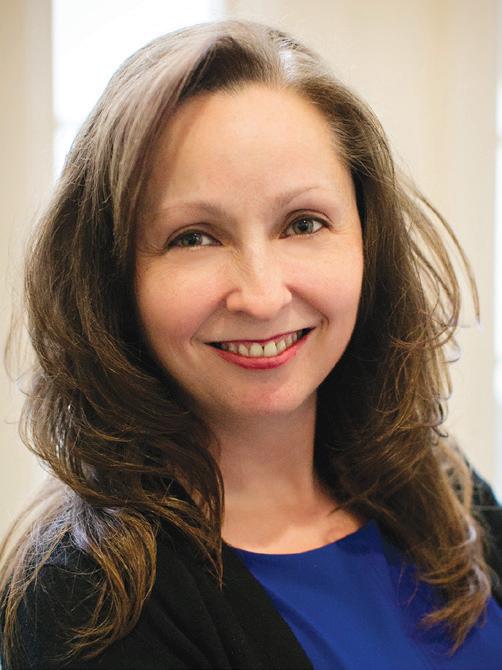
7 minute read
Inaugural Class
Opening Day
Murphy Deming College of Health Sciences welcomes the first class of students to its new campus and plans for expansion with a program for nurses
Advertisement
By Liesel Crosier
STUDENT BODY AT A GLANCE
As of 6/3/14
Physical Therapy
60% Virginia 40% Out of state 74% Women 26% Men
Occupational Therapy
57% Virginia 43% Out of state 94% Women 6% Men
Just two and a half years after announcing the creation of its new graduate school, Mary Baldwin College is opening the doors at Murphy Deming College of Health Sciences and welcoming to a beautiful new campus enthusiastic faculty and a diverse inaugural class of occupational and physical therapy doctoral students.
Staff and students are excited about the school’s interprofessional educational approach in which students in different health care programs learn together with the goal of improving patient care through professional collaboration. This curriculum model is new to allied health and is being developed at Murphy Deming from the ground up. It is an exciting prospect, says Vice President of Health Sciences Linda Seestedt-Stanford.
Seestedt-Stanford is also looking forward to next year’s launch of the master of science in physician assistant studies program and the bachelor of science in nursing degree completion offering for registered nurses.

The three-story flagship building in Fishersville includes four large classrooms; six seminar rooms; eight clinical laboratories, including a simulation suite; two research spaces; faculty/staff offices; and numerous collaborative learning spaces.
Welcome to Class
While the men and women who make up the first group of OT and PT students bring many types of motivation to the classroom, all are enthusiastic about being in the inaugural class. Meet a few of the new scholars at Murphy Deming.
AMY LEHMAN occupational therapy
Lehman, of Lacey Spring, comes to Murphy Deming from James Madison University where she graduated this spring with a degree in health sciences. She hopes to use her occupational therapy doctorate (OTD) to work in geriatrics or hand therapy.
KATHERINE HEINECK occupational therapy
Staunton resident Heineck (left) is “Boldly Baldwin through and through,” as a 2012 MBC graduate with a degree in psychology. She would like to work with as many different populations as possible after earning her OTD to build confidence in the field.
JULIE KRAUS physical therapy
Kraus — originally from Staunton but now living in North Carolina — graduated from the University of North Carolina–Greensboro with a degree in exercise and sports science (now known as kinesiology). If the right opportunity presents itself, Kraus says, she will stay in the Shenandoah Valley after she earns her doctor of physical therapy (DPT).
MATTHEW JEWEL physical therapy
Jewel, from Warsaw, Virginia, earned a degree in kinesiology from James Madison University. After he earns his DPT he is considering a possible career in the military, but ultimately sees himself settling in as a practitioner in an outpatient orthopedic clinic.
Why OT/PT?
AMY: I did not seriously consider occupational therapy until my mother was diagnosed with cancer. After all the deteriorating treatments and surgery, receiving therapy was the first time that the focus was on restoration. Our whole family was encouraged, and my mother was given new hope for the future. Although my mother eventually lost her battle to cancer, I know that I want to contribute the kind of hope that my family was given through occupational therapy.
MATTHEW: I discovered physical therapy as a junior in high school after I experienced a shoulder injury during football season. I was incredibly impressed with the knowledge and care that each of the therapists showed me. The next summer, I began to work at that same clinic as a PT tech and realized that my strengths and interests already meshed well with the field. I am very interested in sports and the specific ways a body functions and moves. Also, I enjoy connecting with people in a way that makes them feel special and cared for.
Why Murphy Deming College of Health Sciences?
JULIE: My personal physical therapist in Greensboro studied under Lisa Shoaf [director of the Murphy Deming physical therapy program] at Virginia Commonwealth University and spoke highly of her as a teacher, mentor, and friend. When I met Dr. Shoaf, I was fascinated by her enthusiasm in building this innovative program; her excitement sparked my own.
AMY: Murphy Deming was a breath of fresh air while searching for a graduate school. This program is revolutionary in its focus on interprofessionalism and utilizing practicing therapists as professors.
How does it feel to be a part of the inaugural class?
AMY: I am honored. I will adhere to a higher standard of professionalism because I am representing a brand new program. I am excited that faculty, staff, and students will be working together.
KATHERINE: No matter where we go or what we do we will always be the standard against which future students are measured. I want to make my faculty proud, so that next year they can say, “the class of 2017 has left some big shoes to fill.”
What value do you see in working with other professionals across similar fields?
KATHERINE: When I have a problem, I’d rather not jump on Google to solve it. I would rather call on someone who knows the answer and benefit from his or her experience. An inter- professional curriculum will make all of us more likely to turn to others with first-hand knowledge, a resource many professionals overlook.
JULIE: Not only will the interprofessional focus prepare all of us for what it will be like as working professionals, but it will also give us a deeper understanding of the patient. Incorporating different aspects of care from the start of someone’s rehabilitation will truly put the patient’s needs at the core of their care.
MATTHEW: When I become a physical therapist, I will not be working in isolation from other health care professionals, so it will be valuable to learn how to collaborate with them. I know I will best serve my patients if I understand the scope of the care they are receiving.
Hospital Helps Launch Degree-Completion Program for Nurses
As hospitals require an increasing percentage of nurses to hold baccalaureate degrees, Mary Baldwin College will help answer the call through the Murphy Deming College of Health Sciences — thanks, in part, to a grant from Augusta Health of $60,000 per year for five years.
The hospital’s sponsorship will help nurses meet national education mandates while allowing MBC to move forward quickly with development of a program that serves compelling regional needs. College faculty plan to launch the bachelor of science in nursing (BSN) degree completion program, or RN-toBSN, in 2015.
“Augusta Health is proud to work with STRONG Mary Baldwin College and the Murphy Deming College of Health Sciences to provide educational alternatives for our nurses and for all nurses in the community,” said Mary N. Mannix, president and CEO of Augusta Health, who began her own career as a hospital nurse.
“[Augusta Health’s] sponsorship now allows us to develop another degree program that will serve Virginia’s RN-prepared nurses, and through them, their patients, as well as our broader community,” said MBC President Pamela Fox. “We are so very grateful for their confidence in us and the opportunity to collaborate for the greater good.” Drew Strong has been named director of Murphy Deming’s newest program. She comes to MBC with a wealth of knowledge and experience in PHOTO BY LINDSEY WALTERS nursing and nursing education. Requirements for completing the BSN will include post-licensure nursing courses as well as general studies coursework. The program will be offered online, allowing working nurses to access their classes when it is convenient. Steve Colvin touts the RN-to-BSN path, which he followed on his way to becoming director of the Progressive Care Unit at Augusta Health. “Much of the coursework was focused on nursing theory, research, and the application of evidence-based practice. I am a believer that these concepts cannot be fully grasped without the working knowledge gained through the experience of being a bedside nurse,” Colvin said. “Nursing is an empathetic art that is informed heavily by scientific medicine. The science can be taught didactically and clinically while the art is honed through experience.”





